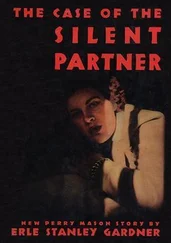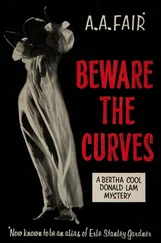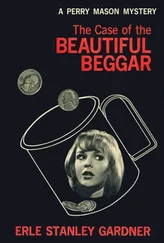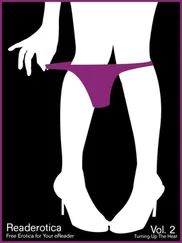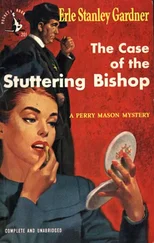A. A. Fair
Turn on the Heat
I opened the door marked Bertha Cool — Confidential Investigations — Entrance . Elsie Brand looked up from her shorthand notes, and, without missing a beat on the keyboard, said, “Go on in. She’s waiting.” The staccato rhythm of her typing followed me across the office and through the door marked Bertha Cool — Private .
Bertha Cool, profane, massive, belligerent, and bulldog, sat back of her desk, her diamonds flashing in the morning sunlight as she moved her hand over a pile of papers, sorting and re-arranging. The thin man in the middle forties seated in the client’s chair looked up at me with anxious, apprehensive eyes.
Bertha Cool said, “You were long enough getting here, Donald.”
I said nothing to her, but sized up the client, a slender man with greyish hair, a grey, close-clipped moustache, and a mouth which seemed more decisive than the general anxiety of his appearance would indicate. He wore blue glasses so dark that it was impossible to distinguish the colour of his eyes.
Bertha Cool said, “Mr. Smith, this is Donald Lam, the man I told you about. Donald, Mr. Smith.”
I bowed.
Smith said, in the voice of a man who has disciplined himself to subordinate general impressions to exact accuracy, “Good morning, Mr. Lam.” He didn’t offer to shake hands. He seemed disappointed.
Bertha Cool said, “Now, don’t make any mistakes about Donald. He’s a go-getter. God knows he hasn’t any brawn, but he has brains. He’s a half-pint runt and a good beating raises hell with him, but he knows his way around. Don’t mind my cussing, Mr. Smith.”
Smith nodded. I thought the nod was somewhat dubious, but I couldn’t see his eyes.
Bertha Cool said, “Sit down, Donald.”
I sat down in the hard, straight-backed wooden chair.
Bertha Cool said to Smith, “Donald can find her if anyone can. He isn’t as young as he looks. He got to be a lawyer, and they kicked him out when he showed a client how to commit a perfectly legal murder. Donald thought he was explaining a technicality in the law, but the Bar Association didn’t like it. They said it was unethical. They also said it wouldn’t work.” Bertha Cool paused long enough to chuckle, then went on: “Donald came to work for me, and the first case he had, damned if he didn’t show ’em there was a loophole in the murder law through which a man could drive a horse and buggy. Now they’re trying to amend the law. That’s Donald for you!”
Bertha Cool beamed at me with a synthetic semblance of affection that didn’t mean a thing.
Smith nodded his head.
Bertha Cool said, “In nineteen hundred and eighteen, Donald, a Dr. and Mrs. James C. Lintig lived at 419 Chestnut Street, Oakview. There was a scandal, and Lintig took a powder. We’re not concerned with him. Find Mrs. Lintig.”
“Is she still around Oakview?” I asked.
“No one knows.”
“Any relatives?”
“Apparently not.”
“How long had they been married when she disappeared?”
Bertha looked at Smith, and Smith shook his head. Bertha Cool kept looking at him, and he said finally, in that precise, academic manner which seemed characteristic of him, “I don’t know.”
Bertha Cool said, “Get this Donald. We don’t want anyone to know about this investigation. Above all, no one is to know who our client is. Take the agency car. Start now. You should get there late tonight.”
I looked at Smith and said, “I’ll have to make inquiries,” and Smith said, “Certainly.”
Bertha said, “Pose as a distant relative.”
“How old is she?” I asked.
Smith knitted his brows thoughtfully, and said, “I don’t know exactly. You can find that out when you get there.”
“Any children?”
Smith said, “No.”
I looked across at Bertha Cool. She opened a drawer In her desk, took out a key, unlocked a cash box, and handed me fifty dollars. “Keep expenses down, Donald,” she said. “It may be a long chase. We’ll have to make the money go as far as possible.”
Smith put his finger-tips together, rested his hands on the front of his grey, double-breasted coat, and said, “Exactly.”
“Any leads to work on?” I asked.
“What more do you want?” Bertha asked.
“Anything I can get,” I said, my eyes on Smith.
He shook his head.
“Know anything about her, whether she had a commercial education, whether she could do any work, who her friends were, whether she had any money, whether she was fat, thin, tall, short, blonde, or brunette?”
Smith said, “No. I can’t help you on any of that.”
“What do I do when I locate her?” I asked.
“Notify me,” Bertha said.
I pocketed the fifty dollars, scraped back my chair, said, “Pleased to have met you, Mr. Smith,” and walked out.
Elsie Brand didn’t bother to look up from her typing as I crossed the outer office.
The agency car was an antiquated heap with tyres worn down pretty close to the fabric. It had a leaky radiator, front wheels that developed a bad shimmy at anything above fifty, and so many rattles the engine knocks were almost drowned out. It was a hot day, and I had trouble getting over the mountains. It was hotter in the valley, and my eyes began to feel like hard-boiled eggs. The hot glare from the road cooked them right in their sockets. I couldn’t get hungry enough to make stopping worth while, but grabbed a hamburger along the road, ate with one hand, and drove with the other. I made Oakview at ten-thirty that night.
Oakview was in the foothill country, and it was cooler up there, with moisture in the air, and mosquitoes. A river came brawling out of the mountains to snake smoothly past the foothill country around Oakview, and spread out on the plains below.
Oakview was a county seat which had gone to seed. They rolled up the sidewalks at nine o’clock. The buildings were all old. The shade trees which lined the streets were old. The place hadn’t grown fast enough to give the city fathers an excuse to widen the streets and rip out the trees.
The Palace Hotel was open. I got a room and rolled in.
Morning sun streaming through the window wakened me. I shaved, dressed, and got a bird’s-eye view of the town from the hotel window. I saw a court-house of ancient vintage, got a glimpse of the river through the tops of big shade trees, and looked down on an alley full of old packing-cases and garbage cans.
I looked around for a place to eat breakfast, and found a restaurant that looked good on the outside, but smelled of rancid grease on the inside. After breakfast I sat on the steps of the court-house and waited for nine o’clock.
The county officials came straggling leisurely in. They were mostly old men with placid faces — browsing along the streets, pausing for choice morsels of gossip. They gave me curious stares as they climbed past me up the steps. I was a stranger. They knew it and showed they knew it.
In the county clerk’s office an angular woman of uncertain age stared at me with black, lacklustre eyes, listened to my request, and gave me the great register of 1918 — a paper-backed volume starting to turn yellow. Its fuzzy-faced type indicated a political plum had been handed to a local newspaper.
Under the L’s, I found: Lintig: — James Collitt, Physician, 419 Chestnut Street, age 33, and Lintig: — Amelia Rosa, Housewife, 419 Chestnut Street . Mrs. Lintig hadn’t given her age.
I asked for the 1919 register and found neither name. I walked out feeling the deputy’s black eyes staring at the back of my neck.
There was one newspaper, the Blade . The lettered sign on the window showed it was a weekly. I went in and tapped on the counter.
Читать дальше

